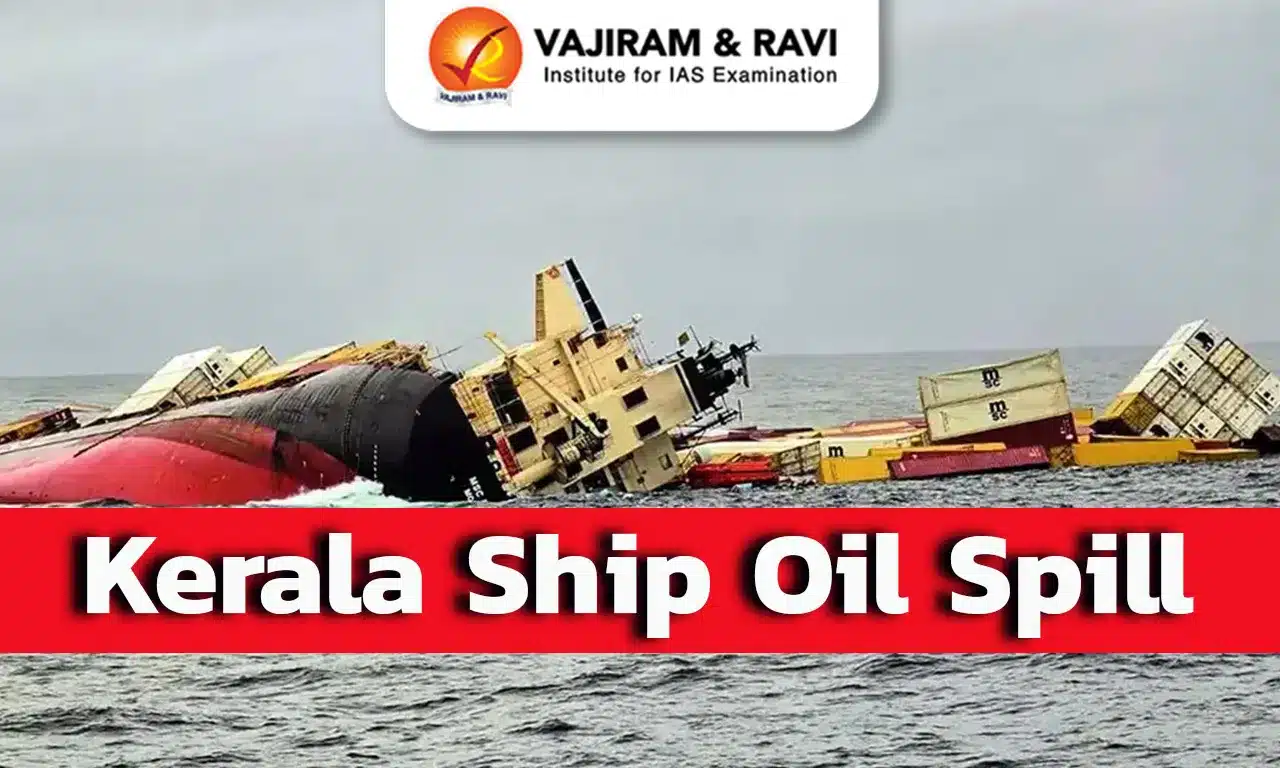Kerala Ship Oil Spill Latest News
- On May 25, a Liberian-flagged cargo ship carrying 640 containers — including 13 with hazardous materials — capsized and sank off the Kerala coast. All crew members were safely rescued by the Indian Coast Guard and Navy.
- The incident raised concerns about a possible oil spill. The Indian Coast Guard deployed Saksham, a ship with pollution response equipment, to handle any spill risks.
Cause of Capsizing
- The cargo ship MSC ELSA 3 capsized rapidly in the early hours of May 25 due to flooding in one of its cargo holds, as confirmed by the Indian Coast Guard (ICG).
- A hold refers to a below-deck compartment used for storing cargo.
- The ship had departed from Vizhinjam port and was headed to Kochi at the time of the incident.
Cargo and Fuel Details
- The vessel was carrying 640 containers, including:
- 13 with hazardous cargo
- 12 with calcium carbide
- 84.44 metric tonnes of diesel
- 367.1 metric tonnes of furnace oil
Oil Spill Monitoring
- ICG deployed aircraft with advanced oil spill mapping technology to monitor the situation. As of now, no oil spill has been reported.
Oil Spill
- An oil spill occurs when oil accidentally enters oceans, seas, or rivers due to natural disasters, human error, or equipment failure.
- It spreads quickly and forms a layer on the water surface because of its lighter density.
Environmental Impact
- The oil layer blocks sunlight, affecting photosynthesis in marine plants and phytoplankton, which are crucial for oxygen production and food chains.
Harm to Marine Life
- Birds lose insulation as oil coats their feathers, leading to hypothermia and drowning.
- Fish and invertebrates may suffer reproductive and growth issues, as noted by the US EPA.
Severity Factors
- The impact depends on:
- Type and volume of oil
- Weather conditions
- Proximity to sensitive ecosystems
Long-Term Consequences
- Severe spills can have decades-long impacts.
- For instance, the 2010 Deepwater Horizon disaster released over 4 million barrels of oil over 87 days into the Gulf of Mexico, killing thousands of wildlife.
International Framework Dealing with Oil Spill: MARPOL Convention
- Oil spill prevention is governed by the International Convention for the Prevention of Pollution from Ships (MARPOL).
- Originated after major oil spill disasters in the 1970s.
- The key protocol was issued in 1978.
- India is a signatory to MARPOL.
Scope of MARPOL
- MARPOL includes six annexes, covering pollution from:
- Oil
- Noxious liquid substances
- Dangerous goods in packaged form
- Sewage
- Garbage
- Air pollution from ships
Domestic Implementation in India
- Enforced through the Merchant Shipping Act.
- Includes provisions for civil liability and pollution prevention certificates.
- Indian ships and foreign ships in Indian waters must comply.
Preparedness and Enforcement
- Ports must have oil spill contingency plans.
- The Indian Coast Guard is the nodal agency for oil spill response and enforcement.
Methods of Oil Spill Cleanup
- Skimming
- Involves removing oil from the sea surface before it reaches the coast.
- Most effective in calm seas.
- In Situ Burning
- Involves burning concentrated patches of oil directly on the water.
- Quick but may produce toxic fumes.
- Chemical Dispersants
- Break down oil into smaller droplets.
- Helps microbes degrade oil into less harmful substances.
- Can be harmful to marine ecosystems.
Challenges in Cleanup
- Rapid Spread of Oil – Oil disperses quickly across water surfaces.
- Weather Conditions – Rough seas and strong currents hinder cleanup.
- Variation in Oil Types – Some oils sink or mix with water (emulsify), making removal harder.
- Environmental Trade-offs – Dispersants may impact marine life. Manual cleanup is slow, labour-intensive, and less effective in remote areas.
Advisory for Local Population Following Shipwreck Near Kerala Coast
- Public Safety Warning
- The Kerala State Disaster Management Authority (KSDMA) has warned locals not to touch any cargo containers or oil that may wash ashore.
- Reporting Protocol
- Residents are urged to immediately inform the police if they see containers or oil along the shore.
- Risk of Oil Contamination
- Oil films may appear on the sea surface near the coast.
- According to INCOIS, oil pollutants may reach Alappuzha, Ambalapuzha, Arattupuzha, and Karunagappally within 36–48 hours.
- These areas are at risk of environmental contamination and need urgent monitoring and response.
Kerala Ship Oil Spill FAQs
Q1. Why did the ship capsize?
Ans. It capsized due to flooding in one of its cargo holds during its voyage from Vizhinjam to Kochi.
Q2. What environmental risk followed the sinking?
Ans. The cargo included oil and hazardous materials, raising concerns of an oil spill and marine ecosystem damage.
Q3. What is MARPOL Convention?
Ans. It’s an international treaty preventing marine pollution from ships; India enforces it via the Merchant Shipping Act.
Q4. How are oil spills cleaned?
Ans. Through skimming, burning, and dispersants—though effectiveness depends on oil type, weather, and proximity to sensitive ecosystems.
Q5. What should locals do now?
Ans. Avoid touching washed-ashore cargo or oil, and report it to police; oil may reach Kollam and Alappuzha coastlines.
Last updated on June, 2025
→ UPSC Notification 2025 was released on 22nd January 2025.
→ UPSC Prelims Result 2025 is out now for the CSE held on 25 May 2025.
→ UPSC Prelims Question Paper 2025 and Unofficial Prelims Answer Key 2025 are available now.
→ UPSC Calendar 2026 is released on 15th May, 2025.
→ The UPSC Vacancy 2025 were released 1129, out of which 979 were for UPSC CSE and remaining 150 are for UPSC IFoS.
→ UPSC Mains 2025 will be conducted on 22nd August 2025.
→ UPSC Prelims 2026 will be conducted on 24th May, 2026 & UPSC Mains 2026 will be conducted on 21st August 2026.
→ The UPSC Selection Process is of 3 stages-Prelims, Mains and Interview.
→ UPSC Result 2024 is released with latest UPSC Marksheet 2024. Check Now!
→ UPSC Toppers List 2024 is released now. Shakti Dubey is UPSC AIR 1 2024 Topper.
→ Also check Best IAS Coaching in Delhi
Tags: kerala ship oil spill mains articles upsc current affairs upsc mains current affairs
























